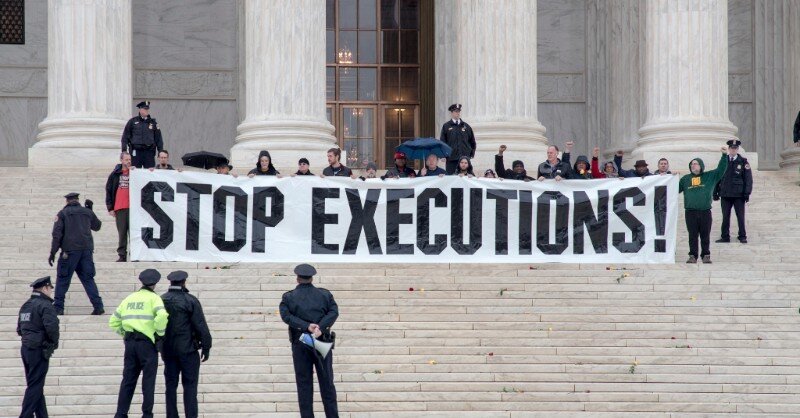When Shane asked if I would be willing to be a part of a protest in Washington DC opposing the death penalty, he mentioned it would mean going to jail. My initial thoughts were, I am too busy to go to jail. I will go to the protest and lend my voice because this is a major injustice that affects the lives of poor people, and disproportionately people of color, but I won’t get arrested.
But on the plane, God convicted me with a question: Are you are too busy speaking and working for justice to actually put your body on the line for justice? Was I willing? I decided to give up my time and my fears to join the group that would be arrested.
I got off the plane, met others with signs and banners, grabbed a couple roses, and marched out behind a large group singing and protesting. Eighteen of us walked up on the Supreme Court steps, dropped the flowers, and held a banner reading Stop Executions. We were told this action was illegal and to leave the steps or we would be arrested. One by one, we were handcuffed and then transported to jail.
Being in handcuffs, squeezing into cramped transportation, and being escorted to the bathroom created a lack of human decency I felt in my body and spirit. The system must be changed so that people – even when they find themselves on the criminal side of the law – will be treated as human beings with dignity.
In jail, our cells were tiny and roach-infested with nothing but metal slabs to sleep on. I expected to face challenging conditions, but I will admit I never expected the inhumane and unacceptable conditions I experienced.
My friend Mike took the opportunity to have a teach-in with other men in the jail. As we all sat in chains, it was a powerful conversation among brothers about justice, the presidency, and what solutions we need to explore.
We were eventually taken from the cells to a waiting room with no seating before heading into the courtroom. Inside the room, sixty black men and two Latino men laid on the floor, leaned against the walls, and paced back and forth. The only white men in the room were the other protesters who’d been arrested with me.
Lawyers conducted interviews, creating chaos. Numbers and names were being shouted the entire time we were in this room. Most of the men needed a court-appointed attorney, and the only opportunity they had to speak with their lawyer was in this noisy, chaotic place. The thought running through my mind was that on any given day in this courthouse, black men are being processed by mostly black officers in a system not designed for us.
During the wait, I listened and spoke with other men. Many were there for small crimes, including a young man who had jumped the turnstile at a train station. I heard story after story of young and old black men and their entanglements with the criminal justice system. The stories are many and varied, ranging from obvious perpetration to blatant injustice.
Finally, we were called into court one by one, then released and given freedom until our individual trials.
My thirty-two hours of arrest brought pain, tears, joy, and challenges as we participated in suffering for justice.The Gospel calls us to stand for justice. While we may feel we are too busy or that’s for “other Christians and not for us, we are too often opting out of the call to love our neighbors as ourselves.
According to Amnesty International, the death penalty, both in the U.S. and around the world, is discriminatory and is used disproportionately against the poor, minorities, and members of racial, ethnic, and religious communities. Since humans are fallible, the risk of executing the innocent can never be eliminated. The majority of death row defendants (77%) have been executed for killing white victims since 1977. The death penalty has been proven to be racially biased and is not a deterrent to crime.
-Leroy Barber


0 Comments